EVANSTON, Ill. (RNS) — The Friday night Kabbalat Shabbat service on Zoom has all the markings of the standard fare: the Sabbath greetings, the singing of the hymn “Lecha Dodi” (“Come My Beloved”), the blessing over the candles, the wine and the challah.
To many an outsider, it would be hard to distinguish Tzedek Chicago from any other synagogue Zoomcast. But on closer inspection, there are clues this congregation is different from most.
Rabbi Brant Rosen begins as he always does, with a land acknowledgment — in this case, recognizing the Indigenous presence of the Ojibwe, Odawa and Potawatomi nations in and around what is now Chicago.
His regular pitch for tzedakah, or donations, before the candle-lighting is directed on behalf of those “suffering under the oppression of structural violence.” On this last Friday before the Jewish new year, which begins Wednesday evening (Oct. 2), he suggested donating to the U.N. Lebanon Humanitarian Fund.
Then he asks one of the congregants to recite a short blessing Rosen composed for the people of Gaza.
Tzedek Chicago, the first anti-Zionist congregation in the U.S., has been holding Friday and Saturday worship services like this for nine years. It formed in the summer of 2015 as a non-Zionist congregation, with a statement that said it would practice “Judaism beyond Zionism” and commit to solidarity with the oppressed and to oppose militarism and colonialism.
“It was very important for me when we started Tzedek to say, we have specific values that we stand for and Zionism is not one of those values,” said 61-year-old Rosen. “Zionism is not consonant with our values as Jews.”
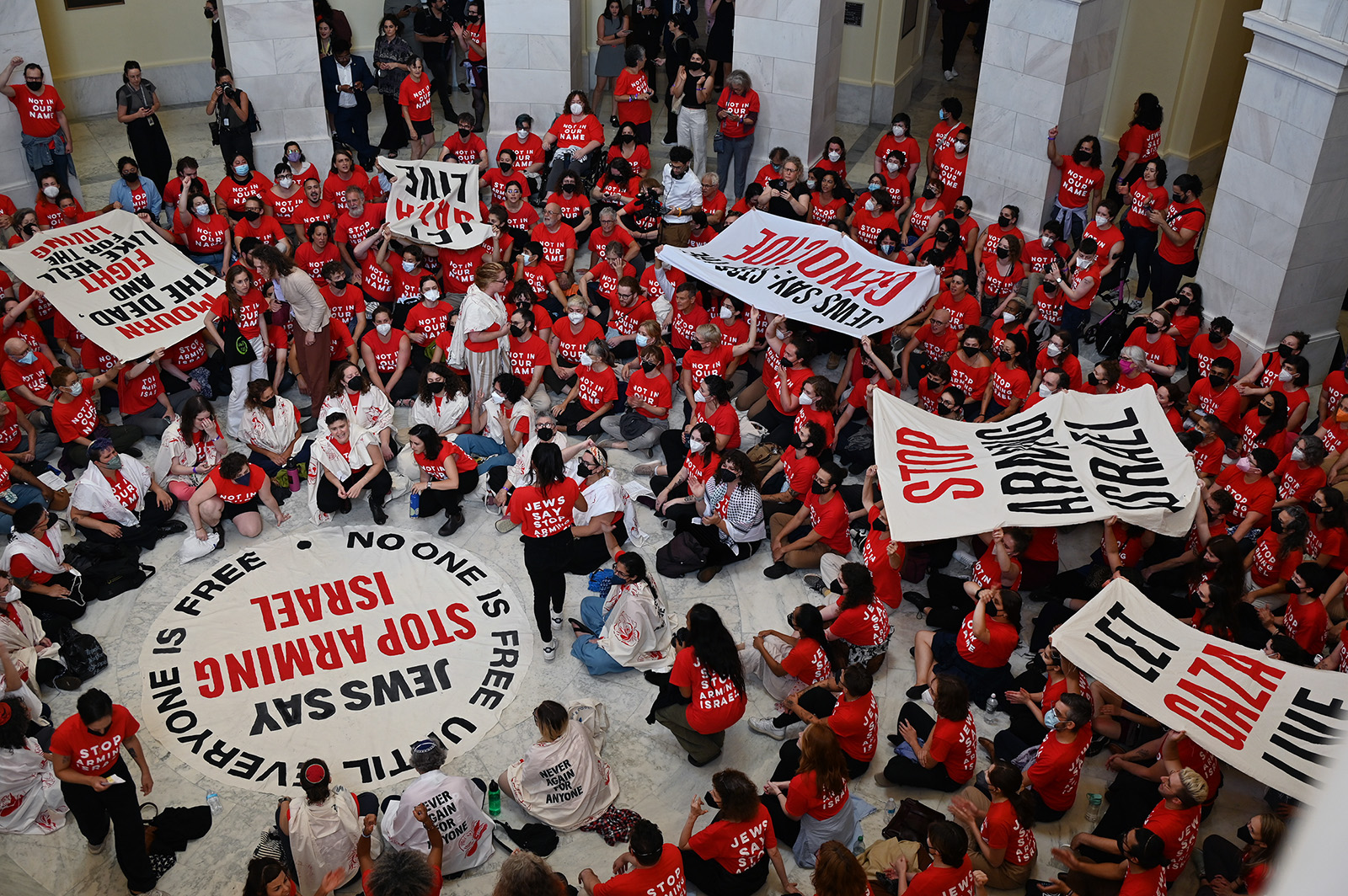
Hundreds of demonstrators protest against the military policies of Israel in the Cannon House Office Building at the Capitol in Washington, July 23, 2024. (RNS photo/Jack Jenkins)
At no time in the past 50 years has the rejection of Zionism received as much of a hearing among American Jews as this past year. In increasing numbers, especially among younger Jews, they have protested the scale and magnitude of Israel’s assault on Gaza, which has leveled the coastal strip and killed at least 42,000 Palestinians, constituting what many say is a genocide.
This year alone, thousands have joined Jewish Voice for Peace, a Palestinian solidarity movement, which now boasts more than 32,000 dues-paying members and has become a powerhouse of anti-Zionist activism, staging massive protests, sit-ins, “die-ins” and other forms of civil disobedience across the country.
This unprecedented embrace of anti-Zionism is at least in part a rebellion against a Jewish establishment that some Jews feel has emphasized fealty to Israel and the Zionist project over the religion’s values of justice and loving-kindness.
Over the past year, American Jews have donated nearly $1 billion toward Israel’s recovery from the Oct. 7 Hamas attack in Israel that killed an estimated 1,200 people. All the major establishment Jewish organizations — the American Jewish Committee, the Anti-Defamation League, the Conference of Presidents of Major American Jewish Organizations — have voiced supported for U.S. military aid to Israel, which this year tops $12.5 billion. They have loudly denounced dissenters from Zionist orthodoxy as not really Jewish and have purged their ranks of anyone who criticizes Israel.
But in cities large and small, anti-Zionist praying communities have been springing up. Sometimes called “chavurot” (fellowships) or “minyanim” (praying quorums), these groups have formed in New York, Los Angeles, Denver and New Haven. In Durham, North Carolina, an anti-Zionist congregation started three years ago and now has a rabbi and an operations organizer on staff.
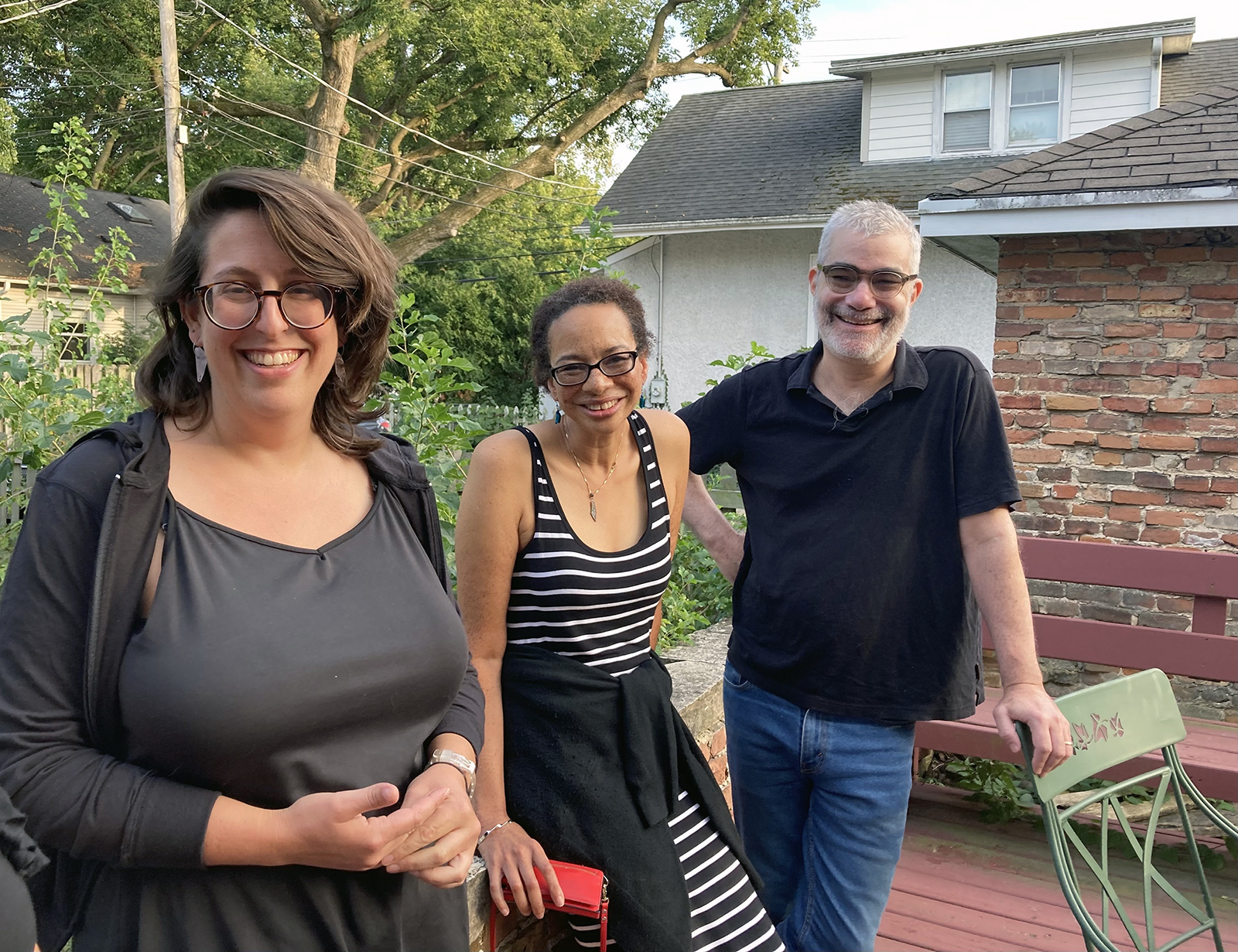
Tzedek Chicago members Aviva Stein, left, Lesley Williams and Rabbi Brant Rosen on Sept. 19, 2024, in Evanston, Ill. (RNS photo/Yonat Shimron)
For many of these anti-Zionist Jews, like Lesley Williams, 62, one of the founding members of Tzedek Chicago, the frustration with the establishment Jewish community’s ongoing willingness to justify and defend the killings of innocent civilians has been intolerable.
“I think Tzedek and JVP are really the only things keeping me in the Jewish community because, frankly, the rest of the Jewish organizations — if those are the ethics and values that Judaism stands for — then I have no use for it whatsoever,” said Williams, a librarian who now works as a college tutor.
Tzedek Chicago was founded by a group of Jews who wanted to stay in touch with Rosen after he quit his pulpit at Evanston’s Jewish Reconstructionist Congregation, where he had served for 16 years.
Once a proud Zionist who had lived in Israel for two years in college, he had become disillusioned with Israel — not just its ongoing occupation of Palestinian lands, but the project of creating a demographic Jewish majority predicated on the expulsion of Palestinians. In 2014, after a previous Israeli assault on Gaza, Rosen felt he could no longer serve his Reconstructionist congregation and keep up his commitments to the Palestine solidarity movement.
His departure left some members feeling adrift ,and they asked him to lead some Shabbat services in their homes. In 2015, the group held a Palestine solidarity seder. Shortly afterward, they took him out to lunch and said, “You know, we think we have a congregation here. We think you should be the rabbi.”
By then, Rosen was working as the Midwest regional director for the American Friends Service Committee, a Quaker peace organization, but he agreed to form a new congregation on top of his full-time job. (He left AFSC in 2019 to devote himself to his nascent congregation.)
Tzedek Chicago (“tzedek” means justice in Hebrew) was born with a statement of core values. Chief among them was the commitment to being non-Zionist. But the statement also spoke of practicing a universalist Jewish identity, predicated on the belief that Jews’ own history of persecution requires that they fight against the oppression of others.
In practice, he said, that means, “We don’t only pray for peace for Jews or for the welfare of Jews only, but for all people, unabashedly.”
Hence the land acknowledgment at the beginning of services, and the prompt to donate to war-torn areas across the world, the frequent recitation of Palestinian poetry and prose in services.
The congregation has never owned a building and since COVID-19 has been meeting mostly online, except for major holidays when it rents church halls or other Chicago-based community spaces.
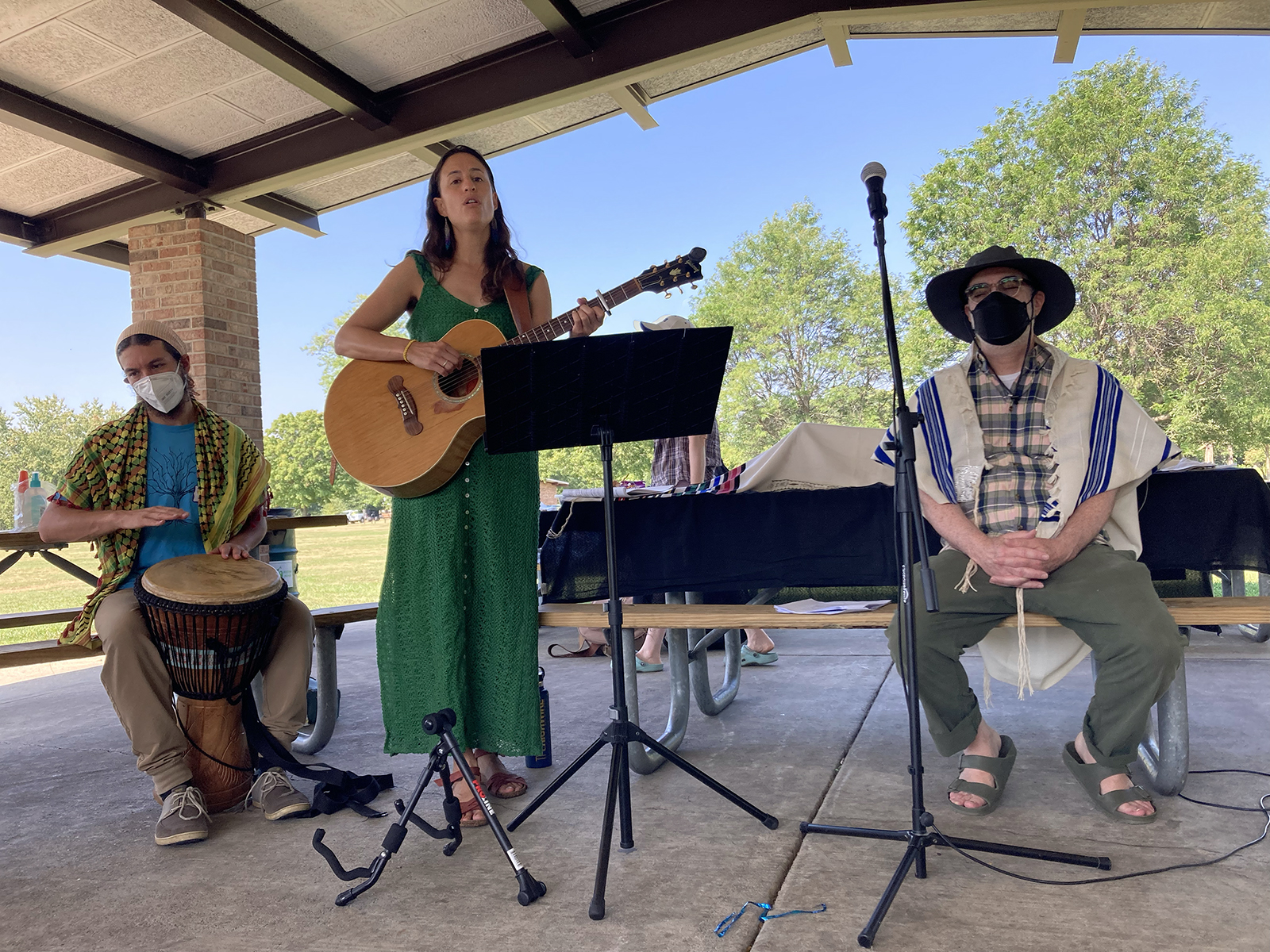
Adam Gottlieb, left, on the drum, Leah Shoshanah Cowen on guitar and Rabbi Brant Rosen during a Tzedek Chicago Saturday morning Shabbat service in a Chicago park in August 2024. (Photo by Aviva Stein)
In 2022, the congregation took a step further. After monthslong conversations, members voted by a three-fourths margin to become not only non-Zionist, but anti-Zionist. In facilitated conversations, a quote from political activist Angela Davis kept cropping up: “In a racist society, it is not enough to be non-racist, we must be anti-racist.” The same, they believed, applied to Zionism.
Members didn’t have to personally adhere to being anti-Zionist, but the congregation as a whole made a statement.
“I think a lot of why the community is so strong is that we don’t all have to agree on things. But we have lines we don’t cross,” said Aviva Stein, the synagogue’s development director.
Stein’s role is a new one. The congregation has doubled in size in the past year — boasting 365 family households from across the world. Members join the online Friday night and Saturday morning Torah studies from England, Ireland, Thailand and Singapore, to name just a few locales.
Since Oct. 7, the congregation has also formed a consensus on another issue: Israel’s actions in Gaza constitute a genocide.
“We don’t dither on it,” said Rosen. “We don’t say, ‘Well, we’re not sure.’”
Other congregations across the country are also grappling with these issues. Ahead of the High Holidays, the organization Rabbis for Ceasefire drafted a directory of more than 70 “open communities” across the U.S. and Canada, congregations that welcome people with a range of views. Sometimes also called “open tent,” these communities draw a mix of Zionists, non-Zionists and anti-Zionists.
“We knew that this year many people wouldn’t be willing to attend services at their family’s synagogue because it has a large ‘We Stand with Israel’ poster out front or an Israeli flag on the podium next to the rabbi,” said Rabbi Alissa Wise, the founder of Rabbis for Ceasefire.
In fact, in some congregations, the discussion has moved to the next phase. One Brooklyn congregation is considering whether its open tent policy is sufficient, with some of its members advocating for the congregation to adopt an anti-Zionist position. At least in part, some synagogues are worried anti-Zionist Jews will decamp elsewhere.
Lauren Fine, a 32-year-old working for a Jewish nonprofit and living in Durham, North Carolina, already made up her mind when she decided to get involved with Makom, a 3-year-old anti-Zionist congregation with about 100 members.
“I was starting to feel a little bit trapped by the assumed Zionism of the other congregations,” said Fine, who serves on Makom’s coordinating committee. “It just felt like I couldn’t explore, I couldn’t question things. That was very stifling for me, and I saw how it hurt other people in my community, too.”
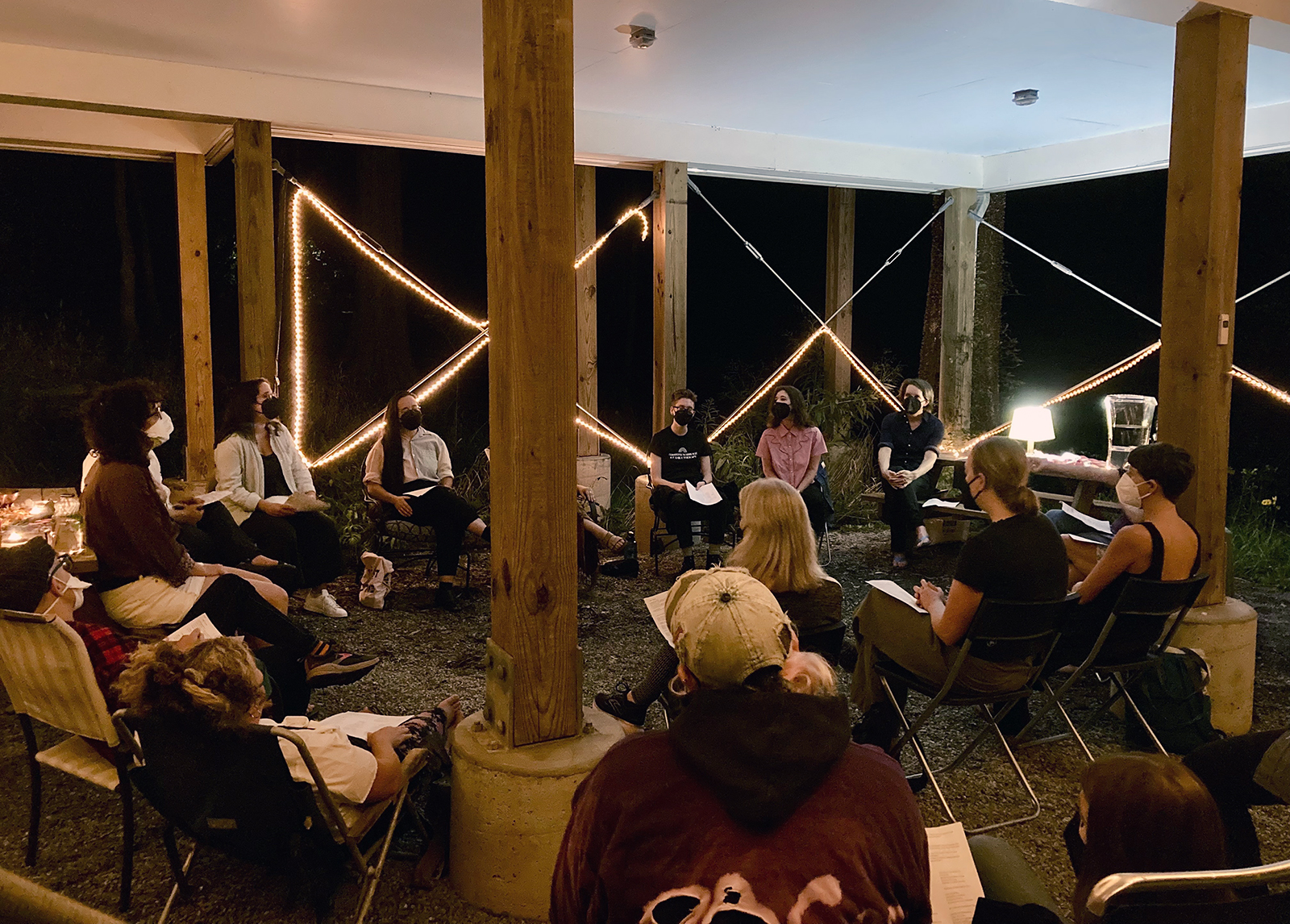
A Selichot penitential song circle hosted by Makom, an anti-Zionist congregation in Durham, N.C., on Sept. 28, 2024. (RNS photo/Yonat Shimron)
That feeling of not fully belonging in other mainstream synagogues drove many of Tzedek Chicago’s members, as well.
Anna Goldberger, a social worker in Chicago, said that because she did not have a bat mitzvah when she was 12 and didn’t learn Hebrew, she felt rejected or not Jewish enough. When she walked into a Tzedek Chicago group she immediately recognized many others who felt the same way.
She also joined a regular Zoom gathering for people grieving their rejection by Jewish family members.
Likewise, Lindsay Janasiak, 40, of Evanston used to describe herself as a “Jew of no choice.” She was born Jewish but did not want to belong. When it came to Israel, she said, “I wasn’t interested. I didn’t feel this pull, like it’s my homeland.”
Then the isolation of the COVID-19 pandemic hit.
“I need to feel some connection,” Janasiak said, describing how she found Tzedek Chicago. “So the first thing I did was I brought my kid — she was 5 then — to a family program. And it was so amazing. I couldn’t believe how great these people were.”
Today, she is a board member serving as Tzedek’s treasurer. She believes congregations like Tzedek that encourage a justice-driven form of Judaism are the future of the Jewish community.
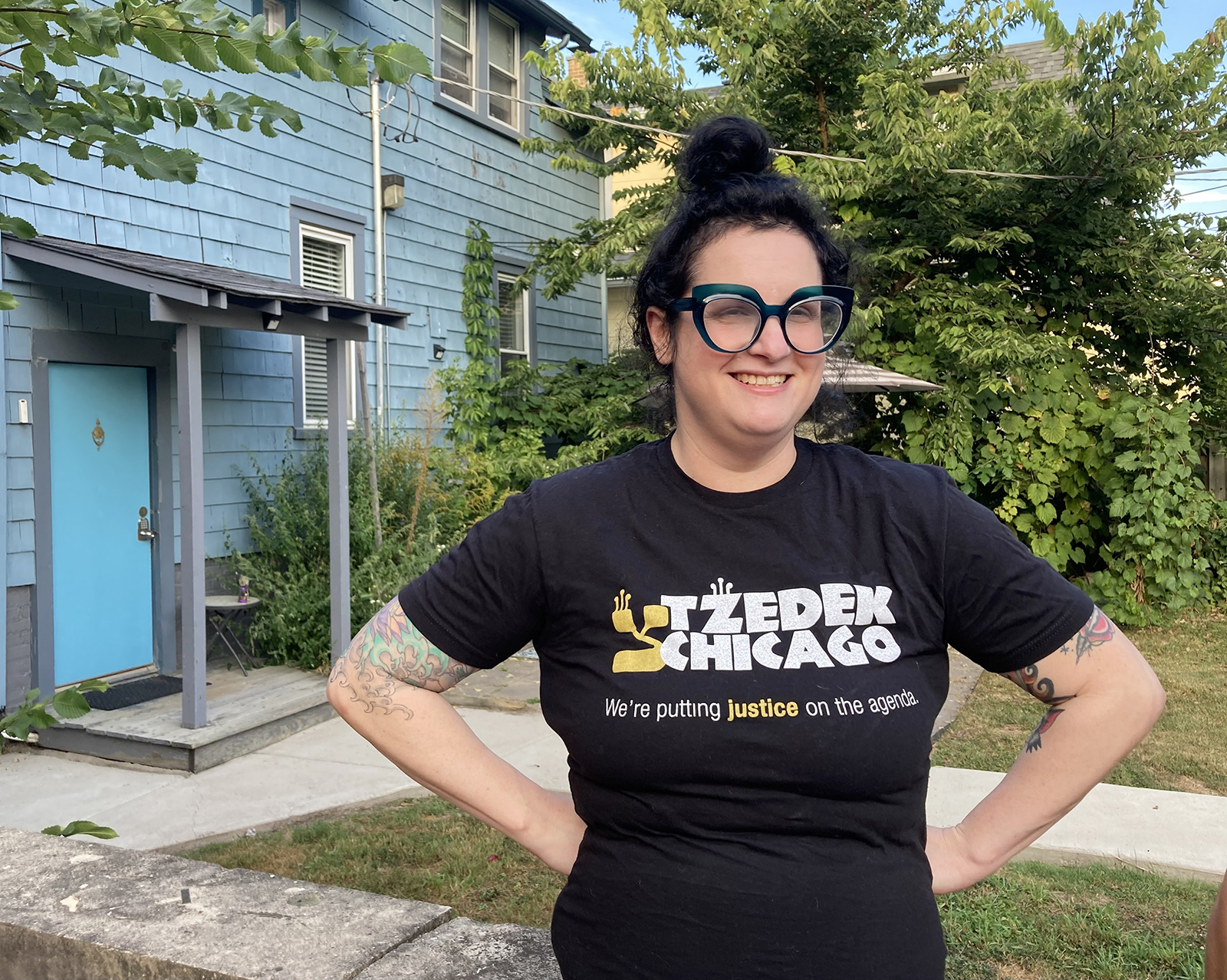
Tzedek Chicago board member Lindsay Janasiak on Sept. 19, 2024. (RNS photo/Yonat Shimron)
“To me, this community we have created for our children, who are the next generation of Jews, is the most important part of it,” Janasiak said. “I would like to nurture an environment where they want be Jewish, they choose to be Jewish, because of the things that I now understand about Judaism that I didn’t.”
Choice was also the subject of the Friday night service last week where Rosen reflected on a passage from that week’s Torah portion: “I have put before you life and death, blessing and curse. Now choose life, so that you and your children may live.”
During Rosh Hashana and Yom Kippur, Jews pray to be inscribed in the book of life for one more year. They have a choice, Rosen said. “A state in the name of the Jewish people has been choosing the way of death,” he said. “We can choose the way of human-ness and humanity.”














